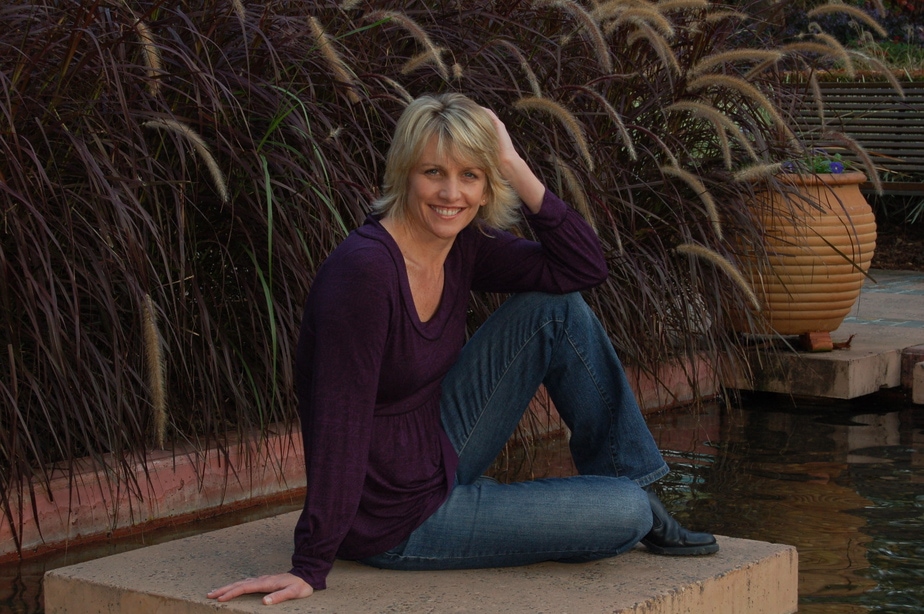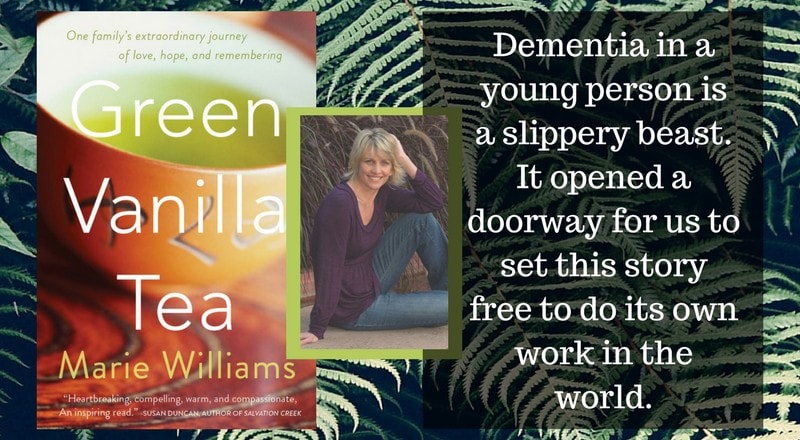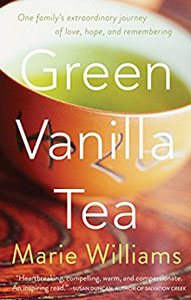I remember the evening my youngest son came through to me in my bedroom holding a rather dog-eared manuscript of Green Vanilla Tea. I had worked on this family story with my two boys over a few years. I’m not sure how many, exactly. We simply worked on it until we’d tussled with it enough and one day it was done. My son leaned against the doorframe, favouring one leg as his dad would have done. I remember noticing how much space he took up in the doorway. No longer the boy he was when this story all began, but a strapping 19-year-old. He was the age I was when I met my husband, the man readers would later get to know as Dominic. I thought he might ask what was for dinner. Like most teenagers, he was perpetually hungry and ate more than I thought humanly possible. But he said,
“Thanks Mom, I think this will be the most powerful story I’ll be able to share with my life partner one day.”
I leaned back against my pillows and thought, Wow, we did it; my job is done.
The manuscript my son held in his arms is a story I wrote that followed our family journey though Dominic’s illness with Younger Onset Dementia and ALS/MND. Dom died in 2007 aged 45. There is heartache and there is humour. But at its core, Green Vanilla Tea is a love story. A story of love and life in a world where so much was amiss, written as an offering of hope to my two [then] teenage sons.
My writing started out as a spontaneous, creative response to grief, with no thoughts of placing this part of our life on display. Amidst the demands of caring for Dom and parenting my sons, writing kept me anchored. It held still the paradox, where life was both empty and full, together and falling apart and the simplest things were the most extraordinary. I wrote of love and loss and finding hope in inexplicable times.
After Dom died, I collated my musings together for the boys. Dementia in a young person is a slippery beast. So much of what they experienced felt invisible and without words. They asked me to write our story. To “try and capture it somehow” and “give it form.” We had no intention to publish. It was enough that my writing provided a wonderful launching pad for rich conversations with my sons.
The human experience is intricate – joyous as it is painful and we explored it all. Whether chopping vegetables at the kitchen counter or driving to the supermarket we talked through every evolving chapter, giving the story voice, and their reflections are woven throughout the pages of their book. One they would be able to share with their life partners one day.
A few years later, I was encouraged to submit the manuscript and this creative act of family storytelling went on to win the Australian Finch Memoir Prize. Has this changed things for me? In some ways, not at all. In other ways, it changed absolutely everything. All at the same time. I go about my daily life as I always have: paying bills, folding crinkled laundry, ironing, (how I hate ironing!) However, I now spend more time in my art studio – a long time dream. And when I think back to the origins of this book, I am deeply grateful for what this award made possible. It is profound affirmation of a story that at one time had no words. More so, it opened a doorway for us to set this story free to do its own work in the world. I’ve received profoundly touching letters from readers all over the globe. Perhaps this is how hope grows.
About the Author
Marie Williams grew up in South Africa and lived in Canada before moving to Australia. She has worked as a clinical Social Worker (MSW) in health settings, clinical education, not for profit sectors and private practice. She is also an artist. She paints under her full name Gela-Marie and these days, spends more time in paint-spattered overalls working in her home-based studio.
Links




6 Responses
Thank you for sharing your story. So touching.
Thanks for your kind words Sandra, I’m so pleased you liked it:) gm
Marie. Thank you for sharing your story and your journey. Mine is similar when I started writing my mom’s memoirs while she was in the late stages of her life with Alzheimer’s and continuing with my film project. These efforts have helped me get through and to honor her memory in a positive way. I know we keep our loved ones that we lost close to us by keeping their memories and the joy (and difficulties) we shared with them alive.
Hi Ross, its heartwarming to read how you honour your mom in such a creative and meaningful way. Creativity certainly provided us a beautiful form of meaning-making. You’re so right, it’s a way to keep the memories and joy of loved ones ever close.
I’ve just discovered your book through AlzAuthors, looked at a sample on Amazon and bought it straight away. In the first few pages you began to describe my life up to and including my husband’s diagnosis of dementia two years ago at the age of 58. We’re still working our way through things and forging our new relationship but what I find really interesting is that, although every single person living with dementia has a different experience, those of us living alongside it experience so many of the same emotions. Thank you for writing about it so clearly and wonderfully.
My husband has FTD/ALS. I am pretty sure he had it before we met 8 years ago, but we finally got the diagnosis last year. We have a little boy together and your book made me cry inconsolably. God Bless you and your boys, for sharing your story. This is such a cruel disease.